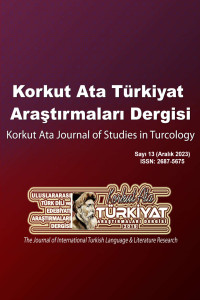Abstract
Kültür milletleri var eden yapı taşıdır. Kültür bir yönüyle toplumsal bellektir ve insan beyninin ürettiği her şeydir. Kültür insanı hayvandan ayıran sadece insana ait bir kavramdır. Kültür insanlar tarafından paylaşılan ve gelecek kuşaklara intikal ettirilen göstergeler bütünüdür. İlk çağlardan günümüze kadar toplumların yaşayışlarında, giyim kuşam, yeme içme âdetleri, düğün, bayram ve ölüm törenleri gibi birçok alanda değişmeler yaşanmıştır. Bunun sonucunda her millete ait farklı uygulamalar ve çeşitlenmeler oluşmuş, toplumları birbirinden ayırıcı özellikler ortaya çıkmıştır. Kültürün özü aynı kalmakla birlikte sürekli değişim halindedir ve gelecek kuşaklara evirilerek aktarılmaktadır. Yine her toplumun kurallarını kendi belirlediği ve kurallarına uyduğu gelenekleri vardır. Bu bağlamda ele aldığımız kültürel değerler sistemi geleneksel mesleklerin de ortaya çıkmasını sağlamaktadır. Geleneksel meslekler yerelle uyum içinde olan ve yerel topluluk tarafından gerçekleştirilen ekonomiye dayalı mesleki faaliyetler olarak tanımlanır. Bir mesleğin gelenek kapsamında değerlendirilebilmesi için toplumun ona ihtiyaç duyması ve uzun süreli bir pratiğinin olması gerekmektedir. Bu meslekler usta-çırak ilişkisiyle sürdürülür ya da babadan oğula geçerek gelecek kuşaklara aktarılır. Anadolu’nun her yerinde geleneksel meslekler toplumun ihtiyaçları doğrultusunda ve teknolojik gelişmelerden de etkilenerek varlığını sürdürmektedir. Bu mesleklerden biri de Çarşamba yumurta topuk ayakkabıcılığıdır. Tarihi uzun yıllara dayanan ve günümüzde de varlığını koruyan Çarşamba yumurta topuk ayakkabısı yapımı usta-çırak ilişkisiyle günümüze kadar ulaşmıştır. Bu çalışmada Çarşamba yöresine ait olan yumurta topuk ayakkabısının tarihi gelişimi, yapılış evresi, kullanılan malzemeleri ve tanıtımı; bir kent ve kültür imgesine dönüşümü ve kültür endüstrisine katkısı ele alınmıştır.
References
- Arslanoğlu, İ. (2000). Kültür ve Medeniyet Kavramları. Hacı Bektaş Veli Araştırma Dergisi, 15, 243-255.
- Gürçayır, S. (2011). Somut Olmayan Kültürel Mirasın Korunması Sözleşmesi Üzeine Eleştirel Bir Okuma. Millî Folklor, 92, 5-12.
- Güzel, C. & Kuşdemir, O. F. (2018). Bir Kent İmgesi Olarak Amasya Elması. Dede Korkut Uluslararası Türk Dili ve Edebiyatı Araştırmaları Dergisi, 7(17), 206-221.
- Hayatını ‘yumurta topuk’ ayakkabıya adadı. https://www.aa.com.tr/tr/yasam/hayatini-yumurta-topuk-ayakkabiya-adadi/849179 [Erişim tarihi: 30.11.2023].
- Oğuz, M. Ö. (2002). Küreselleşme ve Uygulamalı Halkbilimi. Ankara: Akçağ Yayınları.
- Özdemir, C. (2021). Bir Kent İmgesi Olarak Bafra Nokulu. Erdem Dergisi, 81, 93-120.
- Özdemir, N. (2008). Kültürel Ekonomik İmge Olarak Nasreddin Hoca. Millî Folklor, 77, 11-20.
- Özdemir, N. (2011). Kentlerin Gezgin İmgeleri veya Kent İmgeleri Giydirilen Otobüsler. Millî Folklor, 89, 41-53.
- Tepeköylü, İ. (2016). Kent İmgesinin Kültür Ekonomisine Dönüşüm Örneği: İzmit ve Pişmaniye. International Journal of Academic Value Studies, 2(3), 24-29.
- Tikbaş Apak, F. (2022). Bir Kent İmgesi Olarak Rize Simidi. Kahramanmaraş Sütçü İmam Üniversitesi Sosyal Bilimler Dergisi, 19(3), 1298-1309.
- Türk Patent ve Marka Kurumu https://ci.turkpatent.gov.tr/Files/GeographicalSigns/640dc24c-7b49-4408-968d-1b5a81782e20.pdf [Erişim tarihi: 30.11.2023].
- Yurtseven, R. (2010). Topluluk Girişimciliği ve Geleneksel Meslekler. Girişimcilik ve Kalkınma Dergisi, 5(2), 21-28
Abstract
Culture is the building block that creates nations. In one sense, culture is social memory and everything produced by the human brain. Culture is a concept that belongs only to humans, distinguishing humans from animals. Culture is the set of signs shared by people and passed on to future generations. From ancient times to the present day, there have been changes in the lives of societies in many areas such as clothing, eating and drinking customs, weddings, holidays and death ceremonies. As a result, different practices and variations have occurred in each nation, and distinguishing features of societies have emerged. Although the essence of culture remains the same, it is constantly changing and is evolving and being passed on to future generations. Again, every society has its own traditions in which it determines its own rules and follows its own rules. In this context, the cultural value system we discuss also causes the emergence of traditional professions. Traditional professions are defined as economically based occupational activities that are in harmony with local tradition and performed by the local community. In order for a profession to be considered within the scope of tradition, the society must need it and it must have a long-term practice. These professions are continued through a master-apprentice relationship or are passed on to future generations by passing from father to son. Traditional professions continue to exist all over Anatolia, in line with the needs of society and being affected by technological developments. One of these professions, Çarşamba egg heel shoe making, which has a long history and continues to exist today, has survived to the present day through the master-apprentice relationship. In this study, the historical development, production phase, materials used and introduction of egg heel shoes belonging to Çarşamba region; Its transformation into a city and cultural image and its contribution to the culture industry are discussed.
References
- Arslanoğlu, İ. (2000). Kültür ve Medeniyet Kavramları. Hacı Bektaş Veli Araştırma Dergisi, 15, 243-255.
- Gürçayır, S. (2011). Somut Olmayan Kültürel Mirasın Korunması Sözleşmesi Üzeine Eleştirel Bir Okuma. Millî Folklor, 92, 5-12.
- Güzel, C. & Kuşdemir, O. F. (2018). Bir Kent İmgesi Olarak Amasya Elması. Dede Korkut Uluslararası Türk Dili ve Edebiyatı Araştırmaları Dergisi, 7(17), 206-221.
- Hayatını ‘yumurta topuk’ ayakkabıya adadı. https://www.aa.com.tr/tr/yasam/hayatini-yumurta-topuk-ayakkabiya-adadi/849179 [Erişim tarihi: 30.11.2023].
- Oğuz, M. Ö. (2002). Küreselleşme ve Uygulamalı Halkbilimi. Ankara: Akçağ Yayınları.
- Özdemir, C. (2021). Bir Kent İmgesi Olarak Bafra Nokulu. Erdem Dergisi, 81, 93-120.
- Özdemir, N. (2008). Kültürel Ekonomik İmge Olarak Nasreddin Hoca. Millî Folklor, 77, 11-20.
- Özdemir, N. (2011). Kentlerin Gezgin İmgeleri veya Kent İmgeleri Giydirilen Otobüsler. Millî Folklor, 89, 41-53.
- Tepeköylü, İ. (2016). Kent İmgesinin Kültür Ekonomisine Dönüşüm Örneği: İzmit ve Pişmaniye. International Journal of Academic Value Studies, 2(3), 24-29.
- Tikbaş Apak, F. (2022). Bir Kent İmgesi Olarak Rize Simidi. Kahramanmaraş Sütçü İmam Üniversitesi Sosyal Bilimler Dergisi, 19(3), 1298-1309.
- Türk Patent ve Marka Kurumu https://ci.turkpatent.gov.tr/Files/GeographicalSigns/640dc24c-7b49-4408-968d-1b5a81782e20.pdf [Erişim tarihi: 30.11.2023].
- Yurtseven, R. (2010). Topluluk Girişimciliği ve Geleneksel Meslekler. Girişimcilik ve Kalkınma Dergisi, 5(2), 21-28
Details
| Primary Language | Turkish |
|---|---|
| Subjects | Turkish Folklore in the Türkiye Field |
| Journal Section | Araştırma Makaleleri |
| Authors | |
| Publication Date | December 31, 2023 |
| Submission Date | December 29, 2023 |
| Acceptance Date | December 31, 2023 |
| Published in Issue | Year 2023 Issue: 13 |

